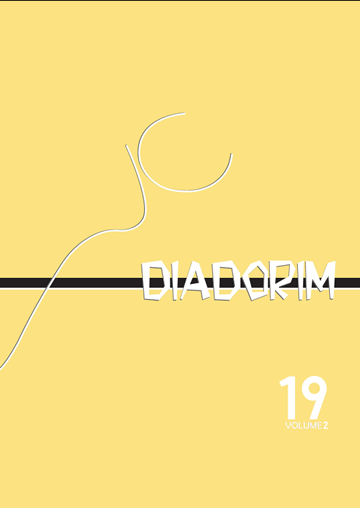Towards a Characterization of Grammar Teaching and Learning in Portugal: Teachers'Perceptions
DOI:
https://doi.org/10.35520/diadorim.2017.v19n2a10034Keywords:
Ensino gramatical, Perceções de professores, Conhecimento do conteúdo gramatical, Conhecimento pedagógico do conteúdo gramatical, Conhecimento curricularAbstract
Our main goal is to investigate, in the Portuguese educational context of the last two decades, marked by a rapid succession of curricular norms concerning language education, how grammar teaching is perceived by primary and middle school teachers, responsible for the frst six years of schooling.
Based on the Educational Linguistics' framework (SPOLSKY, 1999) and on grammar teaching in particular, we analyze and discuss the perceptions these teachers have about their professional knowledge involving grammar teaching, in the light of the model proposed by SHULMAN (1987) and adapted by GROSSMAN (1990). Te selected methodological framework was a collective case study. We present the results of a questionnaire survey, applied to 200 teachers, in order to identify (i) the importance given to and the frequency these teachers work with grammatical knowledge, (ii) the degree of appropriateness perceived as to their own content and pedagogical content knowledge involved in grammar teaching, as well as (iii) the difculties they perceive in grammar teaching and learning.
Te results allow us to assume a complexity of factors involved in building these perceptions and potentially involved in grammar teaching: content knowledge, pedagogical content knowledge and also curricular knowledge. Based on these results, we problematize grammar teaching by emphasizing the need for a renewal of pedagogical practices training and the awareness as to the different dimensions involved, so that teachers can take more consistent pedagogical options regarding their implications. Terefore it seems to be necessary to rethink these teachers training, aiming to (re)create awareness among teachers about the complexity of the implied knowledge involved in grammar teaching and its effective role in the construction of students learning.
References
COSTA, Ana Luísa. Estruturas contrastivas: desenvolvimento do conhecimento explícito e da competência de escrita. 2010. Dissertação (doutoramento em Linguística Educacional) -- Faculdade de Letras, UL, Lisboa, 2010. Disponível em http://repositorio.ul.pt/handle/10451/2216. Acesso em: 30 abril 2017.
DELGADO-MARTINS, Maria Raquel et al. Para a Didáctica do Português. Seis Estudos de Linguística. Lisboa: Colibri, 1992, pp. 165-177.
DESPACHO n.º 17169/2011. Diário da República, 2.ª série N.º 245 de 23 de dezembro de 2011. p. 50080. Disponível em https://www.dge.mec.pt/sites/default/files/Basico/Legislacao/despacho_17169_2011.pdf. Acesso em: 30 abril 2017.
DGEBS. Organização Curricular e Programas. Lisboa: Direção Geral do Ensino Básico e Secundário -- Ministério da Educação, 1991. Disponível em http://www.colegiopedroarrupe.pt/folder/galeria/ficheiro/14_Programa1CicloEB_brtlvw81nf.pdf. Acesso em: 30 abril 2017.
DGIDC. Posição dos Docentes Relativamente ao Ensino da Língua Portuguesa. Lisboa: Direção Geral de Inovação e Desenvolvimento Curricular -- Ministério da Educação, 2008. Disponível em http://profpaulo.weebly.com/uploads/3/9/4/7/394769/posicaodosdocentesseminario.pdf. Acesso em: 30 abril 2017.
DUARTE, Inês. O Conhecimento da Língua: Desenvolver a Consciência Linguística. Lisboa: Direção Geral de Inovação e Desenvolvimento Curricular, 2008. Disponível em http://area.dge.mec.pt/gramatica/O_conhecimento_da_lingua_desenv_consciencia_linguistica.pdf. Acesso em: 30 abril 2017.
DUARTE, Inês. Língua Portuguesa. Instrumentos de Análise. Lisboa: Universidade Aberta, 2000.
DUARTE, Inês. “Algumas boas razões para ensinar gramática”. In.: A Língua Mãe e a Paixão de Aprender. Actas. Porto: Areal, 1998, pp. 110-123.
DUARTE, Inês. “Oficina gramatical: contextos de uso obrigatório de conjuntivo”. In.: DELGADO-MARTINS, Maria Raquel et al. Para a Didáctica do Português. Seis Estudos de Linguística. Lisboa: Colibri, 1992, pp. 165-177.
DUARTE, Inês. “Funcionamento da Língua: a periferia dos NPP”. In.: DELGADO-MARTINS, Maria Raquel et al. Documentos do Encontro sobre os Novos Programas de Português. Lisboa: Colibri, 1991, pp. 45-59.
REIS, Carlos et al. Programas de Português do Ensino Básico. Lisboa: Direção Geral de Inovação e Desenvolvimento Curricular - Ministério da Educação, 2009. Disponível em http://www.colegiopedroarrupe.pt/folder/galeria/ficheiro/14_ProgramasPortugues_skr9m3gn77.pdf. Acesso em: 30 abril 2017.
SHULMAN, Lee. “Knowledge and teaching: foundations of the new reform”. Harvard Educational Review 57 (1), pp. 1-22, 1987. Disponível em https://people.ucsc.edu/~ktellez/shulman.pdf. Acesso em: 30 abril 2017.
SILVA, António Carvalho. “A configuração do ensino da gramática nos novos manuais de português do 9.º ano”. Diacrítica n.º 30/1, pp. 83-112, 2016. Disponível em http://ceh.ilch.uminho.pt/publicacoes/Diacritica_30-1.pdf. Acesso em: 30 abril 2017.
SIM-SIM, Inês; DUARTE, Inês; FERRAZ, Maria João. Língua Materna na Educação Básica: Competências Nucleares e Níveis de Desempenho. Lisboa: Departamento de Educação Básica, 1997. Disponível em http://www.cfaematosinhos.eu/A_Lingua_%20Materna_na_%20Educacao_%20Basica.pdf. Acesso em: 30 abril 2017.
SPOLSKY, Bernard. Introduction to the feld In.: SPOLSKY, Bernard (ed.). Concise Encyclopedia of educational Linguistics. Oxford: Elsevier, 1999. p. 1-6.
TRAVAGLIA, Luiz Carlos. Gramática e interação: uma proposta para o ensino de gramática no 1º e 2º graus. São Paulo: Cortez, 2000.
TRAVAGLIA, Luiz Carlos. Gramática: ensino plural. São Paulo: Cortez, 2003.
UCHA, Luísa (coord.). Desempenho dos alunos em Língua Portuguesa -- ponto da situação. Lisboa: Direção Geral de Inovação e Desenvolvimento Curricular -- Ministério da Educação, 2007.
Disponível em http://www.dge.mec.pt/sites/default/fles/Basico/Documentos/desempenho_alunos_dgidc.pdf. Acesso em: 30 abril 2017.
WATSON, Annabel. Te problem of grammar teaching: a case study of the relationship between a teacher's beliefs and pedagogical practice. Language and Education 29 (4), p. 332-346, 2015
Downloads
Published
Issue
Section
License
Copyright transfer -- Authorization to publication
If the submitted article is approved for publication, it is already agreed that the author authorizes UFRJ to reproduce it and publish it in Diadorim: revista de estudos linguísticos e literários, the terms "reproduction" and "publication" being understood as defined respectively by items VI and I of article 5 of Law 9610/98. The article can be accessed both by the World Wide Web (WWW) and by the printed version, with free consultation and reproduction of a copy of the article for the own use of those who consult. This authorization of publication is not limited in time, and UFRJ is responsible for maintaining the identification of the author of the article.

The journal Diadorim: revista de estudos linguísticos e literários is licensed under a Creative Commons Attribuition-NonCommercial 4.0 International (CC BY-NC 4.0).

